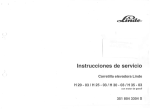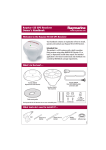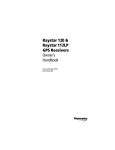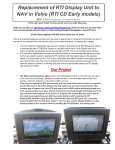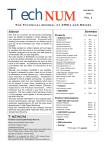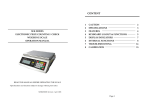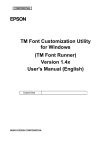Download Raymarine Raystar 112 Installation guide
Transcript
Distributed by Any reference to Raytheon or RTN in this manual should be interpreted as Raymarine. The names Raytheon and RTN are owned by the Raytheon Company. Raystar 112LP GPS Transducer Installation Guide Covers: E32001 SeaTalk Version E32002 NMEA Version Raystar 112LP GPS Transducer Installation IMPORTANT NOTICE This device is only an aid to navigation. Its accuracy can be affected by many factors, including equipment failure or defects, environmental conditions and improper handling or use. It is the user’s responsibility to exercise common prudence and navigational judgement, and this device should not be relied upon as a substitute for such prudence and judgement. Package Contents Checking your Raystar 112LP Package The Raystar 112LP package contains the following standard items: 1. Low profile GPS receiver 2. Flush mount gasket 3. Mounting studs & Thumb nuts (x2) 4. Pole mount attachment 5. Screws (M4) for pole mount attachment (x2) 6. Installation Guide including Warranty document Items Missing? If any of the above items are missing or damaged, please contact your Raytheon dealer or our Product Support Department to obtain replacement parts. Please note that missing or damaged items cannot be replaced without proof of purchase. Registering this Product Once you have checked that you have all of the listed components, please take the time to complete the warranty document and return it to your national distributor. By returning this document you will receive prompt and expert attention should you ever experience any difficulties with this product. Also, your details are added to our customer database so that you automatically receive new product brochures as and when they are released. Raystar 112LP GPS Transducer Installation Summary of Features Receiver type: Frequency: Sensitivity: Signal acquisition: Time to first fix: Position accuracy: Speed accuracy: Geodetic Datum: Cable length: Operating Temp.: Storage Temp.: Data Input/Output: NMEA Version NMEA0183 V2.3 Output Non-isolated NMEA Input RTCM SC-104 Version 2.1 Input SeaTalk Version SeaTalk Bus RTCM SC-104 Version 2.1 Input Lithium battery (10 year life) Memory Backup: Disposal Note: 12 Parallel channels 1575.42 MHz +/- 1 MHz (C/A code), L1 -130dBm Automatic 15 minutes maximum, typically 2 minutes 15m RMS. (L1, C/A code HDOP <2.5 without SA) 0.5m/s RMS. (L1, C/A code HDOP <2.5 without SA) WGS-84 (190 alternatives programmable) 10m (33ft) -10 to 700C (14 to 1580F) -10 to 700C (14 to 1580F) Care should be taken when disposing of this equipment as a Lithium battery is fitted internally. Local regulations may apply and must be adhered to. Raystar 112LP GPS Transducer Installation This page left intentionally blank Raystar 112LP GPS Transducer Installation Raytheon Raystar 112LP GPS Receiver This booklet covers two models of the Raystar 112LP SeaTalk Version Part No. E32001 NMEA Version Part No. E32002 Before commencing installation ensure you have the correct unit for your application. Raytheon Marine cannot be responsible for incorrect operation due to incorrect unit specification. Always state which model you have when making any communication with Raytheon or a registered service agent. GPS Transducer Installation The sensor is designed to receive the signals emitted from the satellites in a direct path. Ideally, the antenna unit should be mounted horizontally in a location that is open and clear of any masts, search lights, or other structures that could block the line-of-sight reception of the antenna unit. The height of the GPS sensor is not as important as the sensor having a clear view horizon to horizon for optimum signal reception. In fact, the lower the antenna can be mounted and have a clear view to satellites, the better. The more stable the antenna, the easier it is to track satellites lower to the horizon. When mounting the GPS receiver flush to a deck surface avoid areas where the unit will be walked on or where it may become a tripping hazard. The GPS sensor should be separated by at least 3ft (1m) from other communication antennas and should not be mounted in the direct path of a Radar’s antenna beam. While planning the location for the receiver, consider finding a convenient pathway for running the interconnecting cable which will connect the GPS receiver to the GPS display unit or to the rest of an integrated system. Ideally the cable should be run in a manner so that it can be hidden from view and, if possible, be in a direct path to the point of connection. It is important to keep the cable separated from other shipboard cables as much as possible to prevent interference pick-up. Note: Mounting on the mast of a sailboat is not recommended Raystar 112LP GPS Transducer Installation Surface Mounting 1. Select a suitable area which allows access to the underside of the mounting surface for fixing and, using the template supplied in this document, carefully drill the two 6mm (0.25in) fixing holes marked. 2. If the cable is to pass through the mounting surface drill the 6mm (0.25in) or 19mm (0.75”) centre hole depending on whether the plug has to pass through the surface or not. If the cable is to exit from the side of the GPS above the mounting surface then remove the two plastic tabs (1) obstructing the cable channel. Note: Failure to remove the plastic tabs from within the cable channel could result in cable damage 3. Screw the supplied brass studs (2) into the underside of the receiver. 4. Stick the supplied gasket (3) to the mounting surface ensuring the holes match and pass the cable through the centre hole or the cable exit channel. 5. Carefully position the receiver passing the studs through the holes in the mounting surface and secure to the mounting surface using the thumb nuts provided (4). 1 2 3 2 3 4 4 D4190-1 Raystar 112LP GPS Transducer Installation Pole/Rail Mounting 1. Screw the pole mount base to a suitable pole or rail mount bracket which has an industry standard 1” 14TPI thread until secure. 2. Pass the cable through the centre hole of the pole mount base (A) or through the cable exit hole alongside the centre hole (B) or insert the cable into the side exit channel (C). 3. Check the cable is positioned correctly and secure the receiver to the pole base using the two screws provided. Note: An optional Rail mount bracket is available from Raytheon (Part No. D360) allowing attachment to hand/guard rails from 19mm (3/4”) to 25mm (1in). D4191-1 Raystar 112LP GPS Transducer Installation Connections NMEA Version Connection is made via a 10m (33ft) cable terminated with a moulded 6 pin connector. 3 Screen (0V/ground) 2 Screen (0V/ground) 4 Yellow (NMEA out)) 1 Red (Power ) 5 Green (NMEA in) 6 Brown (RTCM in) D4192-1 SeaTalk Version Connection is made via the 10m (33ft) cable with bare ends suitable for connection to an existing SeaTalk bus. Red (12V) Yellow (SeaTalk input/output) Brown (RTCM in) Green (not connected) Screen (0V/ground) D4193-1 NMEA Sentences Output GPGGA, GPGSA, GPGSV, GPGLL, GPRMC, GPVTG, GPDTM, PRAYA. Raystar 112LP GPS Transducer Installation Raytheon Raystar 112LP GPS Receiver Mounting Template 36mm (1.4in) 19mm (0.75") dia. for NMEA plug 18mm (0.7in) 36mm (1.4in) 18mm (0.7in) 6mm (0.25") dia. for cable only Cable Exit Channel 6mm (0.25") dia. 2 positions D4194-1 Note: Access to the underside of the mounting surface must be available to allow for secure fixing. Raystar 112LP GPS Transducer Installation This page left intentionally blank Raystar 112LP GPS Transducer Installation EMC Installation & Service Guidelines All Raytheon equipment and accessories are designed to the best industry standards for use in the leisure marine environment. Their design and manufacture conforms to the appropriate Electromagnetic Compatibility (EMC) standards, but good installation is required to ensure that performance is not compromised. Although every effort has been taken to ensure that they will perform under all conditions, it is important to understand what factors could affect the operation of the product. Installation All Raytheon equipment and cables connected to it should be; • At least 1m (3 feet) from any equipment transmitting or cables carrying radio signals e.g. VHF radios, cables and antennas. In the case of SSB radios, the distance should be increased to 2m (7ft). • More than 2m (ft) from the path of a radar beam. • The equipment should be supplied from a different battery than the one used for engine start. This will not damage the equipment, but may cause the loss of some information and can change the operating mode. • Genuine Raytheon cables should be used at all times. Cutting and rejoining these cables can compromise EMC performance and so should be avoided unless doing so is detailed in the installation manual. Check Before Going to Sea • Always check the installation before going to sea to make sure that it is not affected by radio transmissions, engine starting etc... • In some installations, it may not be possible to prevent the equipment from being affected by external influences. In general this will not damage the equipment but can lead to it resetting, or momentarily may result in faulty operation. Servicing and Safety • This product contains no user servicable parts. • Raytheon equipment should be serviced only by authorised Raytheon service engineers. They will ensure that service procedures and replacement parts used will not affect performance. There are no user serviceable parts in any Raytheon product. • Always report any EMC related problem to your nearest Raytheon dealer. We will use any such information to improve our quality standards. Document Number: 81144-1 Raytheon Marine Company 676 Island Pond Road Manchester, NH 03109-5420 USA TEL (603) 647-7530 FAX (603) 634-4756 http://www.raymarine.com Raytheon Marine Europe Ltd. Anchorage Park, Portsmouth Hampshire, PO3 5TD England TEL +44 (0) 1705 693611 FAX +44 (0) 1705 694642 Printed in England














